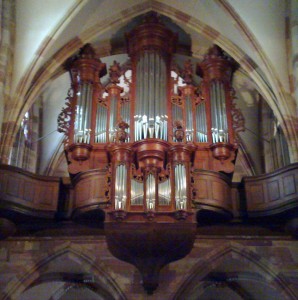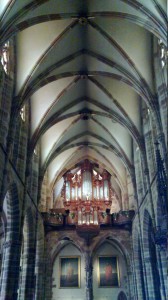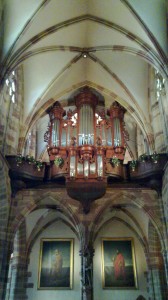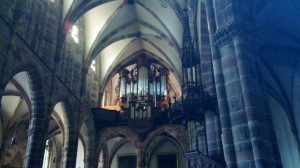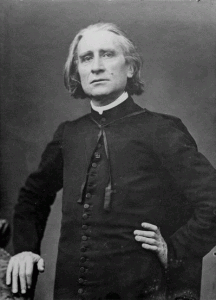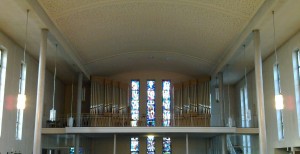
On saturday I had the occasion (but not the time) to play the instrument depicted above. Unfortunately I forgot to take a picture of its console with traditional stops on either side, as I was in a hurry.
It’s quite an interesting instrument, built in 2007 by Freiburger Orgelbau. The disposition of the stops qualifies the instrument for authentic playing of both baroque and romantic organ music:
I. Main (C–g3)
1. Bordon 16’
2. Prinzipal 8’
3. Gedeckt 8’
4. Flute harmonique 8’
5. Viola da Gamba 8’
6. Octave 4’
7. Gemshorn 4’
8. Superoctave 2′
9. Mixtur 4-5fach 1 1/’3’
10. Trompete 8’
Tremulant
II. Swell (C–g3)
11. Geigenprizipal 8′
12. Rohrgedeckt 8’
13. Salicional 8’
14. Vox coelestis 8’
15. Octav 4’
16. Traversflöte 4’
17. Nasard 2 2/’3’
18. Octavin 2’
19. Terz 1 3/’5’
20. Piccolo 1’
21. Trompette harmonique 8’
22. Hautbois 8’
Tremulant
Pedal (C–f1)
23. Prinzipalbass 16′
24. Subbass 16’
25. Octavbass 8’
26. Gedacktbass 8’
27. Octav 4’
28. Bombarde 16’
29. Trompete 8’
Obviously it is dominated by 8’ stops. Its timbre is rather full and warm instead of brilliant. I hope there will be a second chance for playing it. Here are the stops I’m most interested in:
- Prinzipal 8’ – full and warm
- Flute harmonique 8’ – one of my all time favorite stops. The length of those pipes is twice the length necessary, while a small drilling in the middle of the length ensures the pipe’s pitch is correct.
- Trompete 8’ – not a bawler at all
- Vox coelestis 8’ – if you like programming pads with two detuned oscillators on synthesizers, this stop is for you. You will ask “How can I create such a sound on a synth?!?”
- Terz 1 3/’5’ – a third. A unique stop. I had absolutely no luck programming it on a synthesizer.
- Hautbois 8’ – another lingual stop. Another sound you won’t be able to program on a synth.
- Bombarde 16’ – nomen est omen. The right pedal stop for bombastic pieces. Grand Jeux comes to my mind :)
